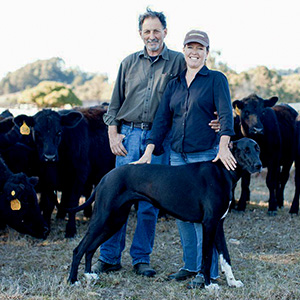

“It’s true that the
industrialized beef industry, with its densely packed feedlots, dependence on antibiotics and fertilizer-intensive corn and soybean, and often inhumane conditions, is indefensible,” she says. “But from an environmental and health standpoint, there is nothing inherently wrong with raising cattle. On the contrary, done in a humane and ecologically sound manner, raising and eating cattle benefits the environment and is beneficial to human health.”
Increasingly, the urban ag movement has begun expanding into livestock production to keep up with growing consumer demand for locally sourced and ethically raised meat. Root Down Farm in Pescadero raises cattle for Santa Cruz-based LeftCoast Grass-Fed Beef. Morris Grassfed Beef, a family-run outfit in San Juan Bautista launched in the early ’90s, supplies meat to restaurants, grocery stores and direct-to-consumer all over California. Paicines Ranch has raised grass-fed cattle since 2001.
Loretta and Bob Heath, Silicon Valley tech workers by day, began raising cattle for their own consumption after moving out to Aromas in 2000. After culling a few-dozen cattle they expanded to a commercial enterprise, Ranchos Dos Fuentes, which is named after twin springs flowing through their property. Because they feed their cows artichoke peelings—waste from a business that sells just the heart—they need less land for the livestock to roam. And the earthiness of artichoke peelings gives their beef a distinct flavor, unlike grassfed meat.
“People want to know where their meat comes from,” says Dede Boies, who runs Root Down with her business partner David Evershed, on land leased from the Peninsula Open Space Trust. “We have people drive by to look at the animals all the time, asking about how they’re raised and see firsthand how we treat them. We’re proud of that kind of transparency.”
Joe Cirone, owner of the Hay Market restaurant in Willow Glen, only buys locally sourced, pastured and grass-fed beef. That entails buying a whole animal and allowing enough flexibility on the menu to utilize everything from head to tail.
“What it means is that you can’t have cheek meat on the menu all the time,” says Cirone. “But the payoff is this incredible taste.”
When he hosted celebrity chef and professional raconteur Anthony Bourdain at the Hay Market last year, Cirone ordered a whole side of beef from Fallon Hills Ranch in Marin County. The meat was dark—a deep cranberry color. The flavor, Cirone says, “delicate, almost like there was a bit of savory vanilla to it,” and “the fat, more golden, not like that bleached white you get from grain-fattened cattle.”
It was a far cry from the supermarket cuts, typically wet-aged in its own juices to speed up production, and letting it sit in a Styrofoam package. “After a while, it tastes like you’re sucking on a penny,” says Cirone.
That dinner with Bourdain helped crystallize Cirone’s vision to study how to create ethically raised, grass-fed beef.
“My direction now is to shrink the production down, with effort and elegance, to take it local and support, not the entire state of California, but the South Bay, with the best meat I can get,” he says.
One of the first myths Niman tackles in her book is that the earth is overrun with cattle and growing hordes of beef eaters, and if we just got rid of the vast herds and ate less meat, we’d be better off. Readers might be surprised to learn that, in fact, there are fewer cattle today than a hundred years ago and that we now eat less beef than ever before. From 1970 to 2005, beef consumption decreased by 22 percent in the United States.


